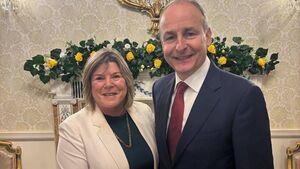‘Waterford got stuffed again’: Experts on the impact of new Déise ministers

Minister of State Mary Butler with Taoiseach Micheal Martin following her appointment as Chief Whip.
Following the appointment of Fine Gael TD John Cummins as Minister of State at the Department of Housing, Local Government and Heritage and Fianna Fáil TD Mary Butler as Chief Whip, Waterford News & Star spoke to two political and economic experts about the impact these positions could have on the Déise.
“I have great respect for anybody who works as a TD - it's a hard job - but Waterford got stuffed again,” said economics expert, Dr Ray Griffin, Senior Lecturer at South East Technological University and co-author of the South East Economic Monitor.
“By not being a Minister, you have nothing to trade at the cabinet table to make sure that the Waterford projects get advanced. We had a junior minister in the last Dáil and we were not able to advance 24/7, the airport or any of the SETU projects.
“I've great hopes for a new government, but I don't specifically think that [Butler’s and Cummins’ positions] will allow us to get anything. The reality is, the last government spent €14bn to €15bn on capital projects, and we did not get our fair share.”
Dr Griffin explained that his work on the seminal South East Economic Monitor project shows that the South East “didn't get anything close” to its fair share of public expenditure.
“As my work on the economic monitor demonstrates, we're getting less than a third of our fair share. We should have got over €1 billion of that money invested into Waterford, and we probably got €200 to €300 million.
“You can see it in the fact that our strategic projects are not advancing, while they are advancing in Dublin, and they have been advancing in Cork.”
Dr Griffin does not believe that Minister of State Mary Butler’s new position as a ‘super junior’ minister as Chief Whip will give her enough leverage to make change for the Déise.
“Marc Ó Cathasaigh was a whip in the last government and was not able to leverage that for any gain for Waterford, so I wouldn’t expect Minister Butler’s role to be a bargaining chip of any worth.”
The economics expert questioned what Minister Butler had got from her steadfast loyalty to her party.
“In reality, if you think about it from a political perspective, she has been very strongly loyal to Fianna Fáil and to Micheál Martin, but it is unlikely that Taoiseach Martin will lead Fianna Fáil into government again. So she has already got what she can get out of that loyalty.”
What of Minister of State at the Department of Housing, John Cummins? The Fine Gael TD has been given responsibility for Local Government and Planning at a politically significant government department on his first time in the Dáil – could this appointment spell success for Waterford?
Dr Griffin disagrees, “While the whole country has difficulties with housing, it’s not as pressing an issue in the South East and in Waterford.
"Our pressing economic issues are related to job quality and IDA multinational investment – which are the best jobs in Ireland. And that's related to the problems we have in unequal funding in higher education - which is the pipeline that feeds multinational jobs.
“So, while [housing] is a national issue, and I wish Minister Cummins well in his role, it has no strategic worth to Waterford.”
The SETU lecturer said the development of Waterford Regional Airport is the single most important project to the South East that Waterford’s representatives could work on.
“The airport is worth approximately €1 billion to the regional economy when fully completed. Those are the kind of numbers that the other regional airports, that one would envisage to be ultimately smaller than Waterford, in Knock [Airport] and Kerry [Airport] are yielding to their regions. So, the €12 million [needed for the project] is chump change given what it would unlock regionally.”
Dr Jennifer Kavanagh, President of the Political Studies Association of Ireland and Law lecturer at SETU, echoed her colleague’s concerns with Waterford set to have no senior minister in cabinet.
Having a “full Minister means you get to speak at cabinet, but most importantly, you get to vote at cabinet. So, that gives you the ability to horse trade”, Dr Kavanagh explained. The vote at cabinet means “you have that ability to make your voice count”.
Minister of State Butler, as chief whip, will have a seat at cabinet but will not have a vote, “Where ‘super juniors’ are different is they get to turn up at the Cabinet meeting, but they don't get a vote, whereas your junior minister is essentially the deputy manager in their department and the buck stops with the full minister.”
“For example, with John Cummins being in the Department of Housing, the buck will stop with the main minister - James Browne TD for Wexford. Now, James Browne is the one bringing stuff to cabinet and has the vote, whereas a junior minister is more akin to middle management.
"All Junior Ministers, even if they don’t say it themselves, would love to be a full minister.”
TDs occupying these ‘middle management’ positions are hesitant to “rock the boat” as they are looking up towards the senior ministerial positions in hope of a promotion in the next election, the President of the Political Studies Association of Ireland said.
Ministers of State Cummins and Butler will both be “caught between the two” loyalties towards constituency and party in their positions.
“I think with Mary Butler there could be a certain level of disappointment that she didn’t get the full ministry because there are too few women in cabinet. As the Social Democrats pointed out, there's as many people named James as there are women.
“There's certainly a very strong argument to say that Mary Butler didn't do well out of the distribution of those cabinet portfolios, whereas John Cummins did very well. While he has been in the Seanad for a while, it's his first time as a TD, and he has already been made a junior minister,” the SETU lecturer said, “but you could kind of see the writing on the wall for him doing well, because he was part of the program for government talks.
“If I was Mary, I would be disappointed. If I was John, I'd be delighted.”






